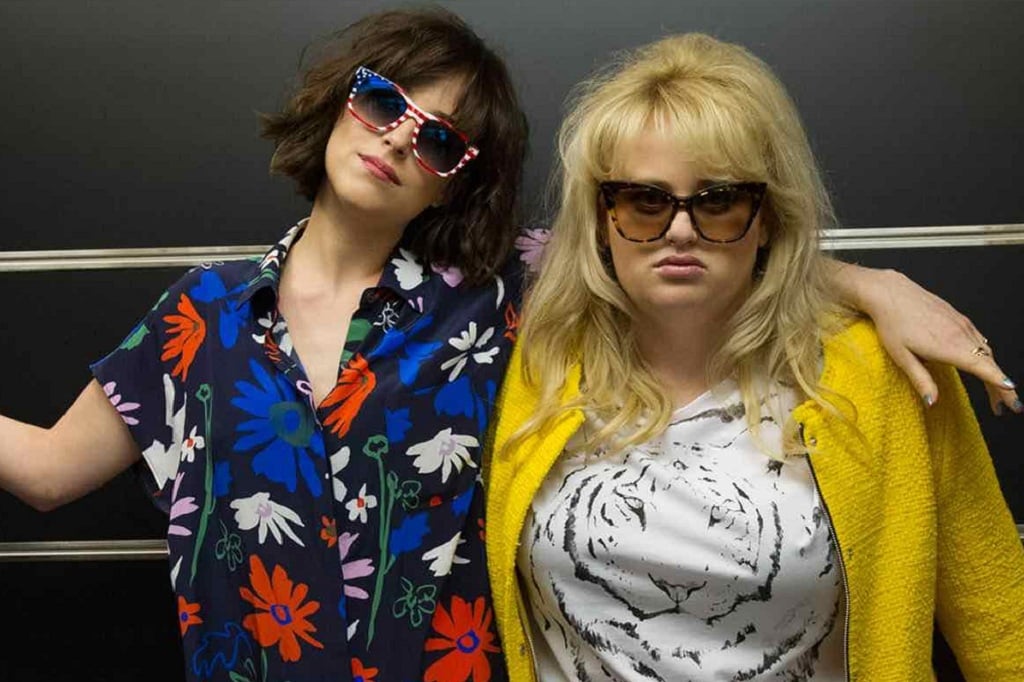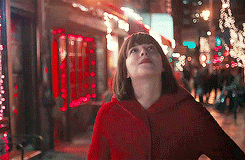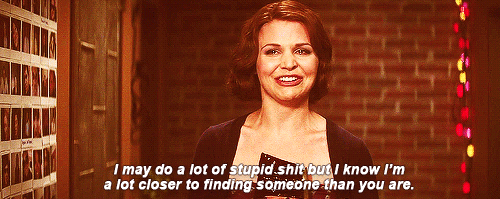‘How To Be Single’ May Be A Mess, But Rebel Wilson Is Still The Worst Thing About It
What exactly is her deal at this point?

At one point in the new romcom How To Be Single, Robin (Rebel Wilson) is riffing horribly on pop culture with Wilson’s trademark slack, dead-fish expression on her face, and familiar flat-yet-arrogant voice. And, just as she’s comparing her workmate Alice’s (Dakota Johnson) pubic hair to Gandalf saying “you shall not pass”, Alice murmurs sadly: “You’ve ruined so many things for me”.
After sitting through the film to this point like a frickin’ Easter Island statue, I burst out with a bark of Mrs Krabappel-style laughter. Wilson really does come dangerously close to ruining How To Be Single. She feels pasted in from a film like Dirty Grandpa, and the film only really improves in the second half, once it shuffles Wilson’s tone-deaf clowning to the background.
–
Rebel Wilson’s Shtick Of Diminishing Returns
How To Be Single follows Alice’s adventures as a Single Gal In New York™. After breaking up with her college boyfriend Josh (Nicholas Braun), she moves in with her older sister Meg (Leslie Mann), a workaholic obstetrician who’s seriously ambivalent about babies. Although Wilson is prominent in the film’s marketing, Robin functions within the film merely as a plot device — a way to bring Alice to the bar owned by freewheeling bachelor Tom (Workaholics‘ Anders Holm, last seen as Anne Hathaway’s despicable wet-blanket husband in The Intern) — and a source of expository lectures on the mores of singledom.
The idea that Alice and Robin would ever be long-term BFFs after Alice finds her feet in New York reads as absurdly phony because Wilson is incapable of projecting any genuine emotion, or even anything likeable beyond her clowning. At this stage in her procession of essentially interchangeable roles, Wilson seems to be positioning herself as a female John Belushi — a bawdy, shambolic party animal who cares nothing for social rules. But, while Belushi used his comic mayhem to diverse effect, and could actually be charming, Wilson makes her limitations more obvious with every appearance, coming across increasingly as a one-note boor.
Wilson’s schtick is the contrast between her flat affect and her physical exuberance and shameless speech. This approach only works when we can read it as naive. (Her recent, controversial BAFTAs speech seems intended to parody bad, ‘gaffe’-filled awards speeches — she spoke very deliberately, like a high-school debater, and fumbled with her hard-copy notes.) Yet what makes her so desperately unfunny is that she’s failed to refine her shtick over time, so it’s come to seem unpleasantly mannered and calculating.
As I noted in reviewing Pitch Perfect 2, Wilson simply doesn’t have the chops to carry any moment more involved than a pratfall or a quip. As a result of this, in How To Be Single, Robin comes across as boring and narcissistic, with no interest in Alice’s feelings. There’s also an agonisingly interminable bit in which Wilson riffs and riffs on Robin’s failure to realise there’s a joint stuck to her face from the previous night’s revels. Like another famous New York single girl, I couldn’t help but wonder what a more talented comic actress might have made of the role.
–
Processed Meat From The Romcom-Industrial Complex
I deliberately evoked Sex and the City because Liz Tuccillo, who wrote the book on which How To Be Single is based, was a script editor on that series penning its famous Post-It breakup episode. Tuccillo also wrote the book He’s Just Not That Into You, which was turned into a 2009 anthology film by screenwriters Abby Kohn and Marc Silverstein, executive-produced by Drew Barrymore.
Kohn and Silverstein’s breakthrough script was the charming Never Been Kissed (1999), which Barrymore starred in and also exec-produced. They then went on to work on Valentine’s Day (2010), The Vow (2012), and now, How To Be Single, a film also co-produced by Barrymore.

Romcom illuminati exposed.
Meanwhile, the film’s director Christian Ditter’s last work was the melodrama Love, Rosie (2014), and additional screenwriter Dana Fox — who wrote The Wedding Date (2005), What Happens in Vegas (2008) and Couples Retreat (2009) — also created the 2012 sitcom Ben and Kate, which starred Dakota Johnson. In other words, this film is deeply enmeshed within the tropes, personnel and production systems of modern screen romance.

This helps explain why it’s so conceptually ambitious, striving to be original by blending several subgenres. It’s a young woman’s self-knowledge parable in the vein of Wild (which Alice even reads in the film) or Eat, Pray, Love. It also wants to be a post-Girls tale of female friends wise-cracking their way through New York’s fraught singles scene — indeed, Meg chides her younger sister for being too inspired by Sex and the City.
Johnson rises to this challenge. Her diffident, gawky gamine quality — so refreshing in Fifty Shades of Grey — makes Alice seem sincere, both when she’s genuinely soul-searching or bonding with her sister, and when she’s bantering with potential lovers. And with her expressive face and daffy voice, Mann’s Meg shifts between zany and vulnerable. Her bravado conceals something more uncertain and unguarded — there’s a delightful extended sequence in which Meg flirts with a baby.
Most strikingly, the film has the ‘wistful zeitgeist’ vibe of an anthology romance, in which the lives of many characters overlap and intersect in ways that are claimed to be representative of modern relationships. The large ensemble cast of such films necessitates storytelling based on vignettes and serendipitous relationships (what, you’re his brother?).
However, this film crams too many subplots into a protagonist-led story. I wasn’t sure whose love lives to invest most in: Alice, Meg, or Tom the barman, who finds himself falling for Lucy (Alison Brie), a fussy woman who obsessively uses dating apps to seek her very specific ideal man. Like Robin, Lucy is only a secondary character, and her paramours (chiefly Colin Jost and Jason Mantzoukas) basically amount to cameos. I felt sorry for Brie, who has little to work with: Lucy has basically no personality apart from being neurotic and clingy.

Wonder where they got that?
–
Do Single People Really Yearn To Settle Down?
One of the most disappointing things about Amy Schumer’s Trainwreck was that it established Amy as a contented hedonist, only to make her realise that she was actually damaged and pathetic. The remedy? To make Amy abandon her own desires and overhaul her whole life to become what her romantic partner wants.
We’re culturally conditioned to expect Hollywood movies to reward their characters with love: from Pretty in Pink’s awkwardly revised finale that paired Duckie off with some rando to Four Weddings and a Funeral’s heart-warming coda pairing off every single character in the film. Even today’s fairytales are self-aware enough to subvert “true love”: in Frozen it’s sisterly love, and in Maleficent it’s maternal love.
With this in mind, watching How To Be Single was like watching a roulette wheel in motion, trying to predict where each character would settle. Would Alice get back together with Josh? Would she opt for widowed dad David (Damon Wayans Jr), or perhaps hook up permanently with Tom? Also, would Tom find love with Lucy? Would Meg be happy with cute, attentive Ken (Jake Lacy), even though she keeps pushing him away? Is Lucy’s perfect match Paul or George (or even John or Ringo)? And as for Robin, who even gives a fuck?
Ultimately, the film’s hybrid structure saves it from being so sappy and predictable. But that same hybridity makes it unsatisfying — neither as bawdy as its marketing promises, nor as inspirational as its title suggests. How To Be Single is instead bogged down by all the things it sets out to be, and only the assured performances from Johnson and Mann can carry its tonal shifts. God knows Rebel Wilson can’t.
–
How To Be Single is cinemas now.
–
Mel Campbell is a freelance journalist and cultural critic. She blogs on style, history and culture at Footpath Zeitgeist and tweets at @incrediblemelk.